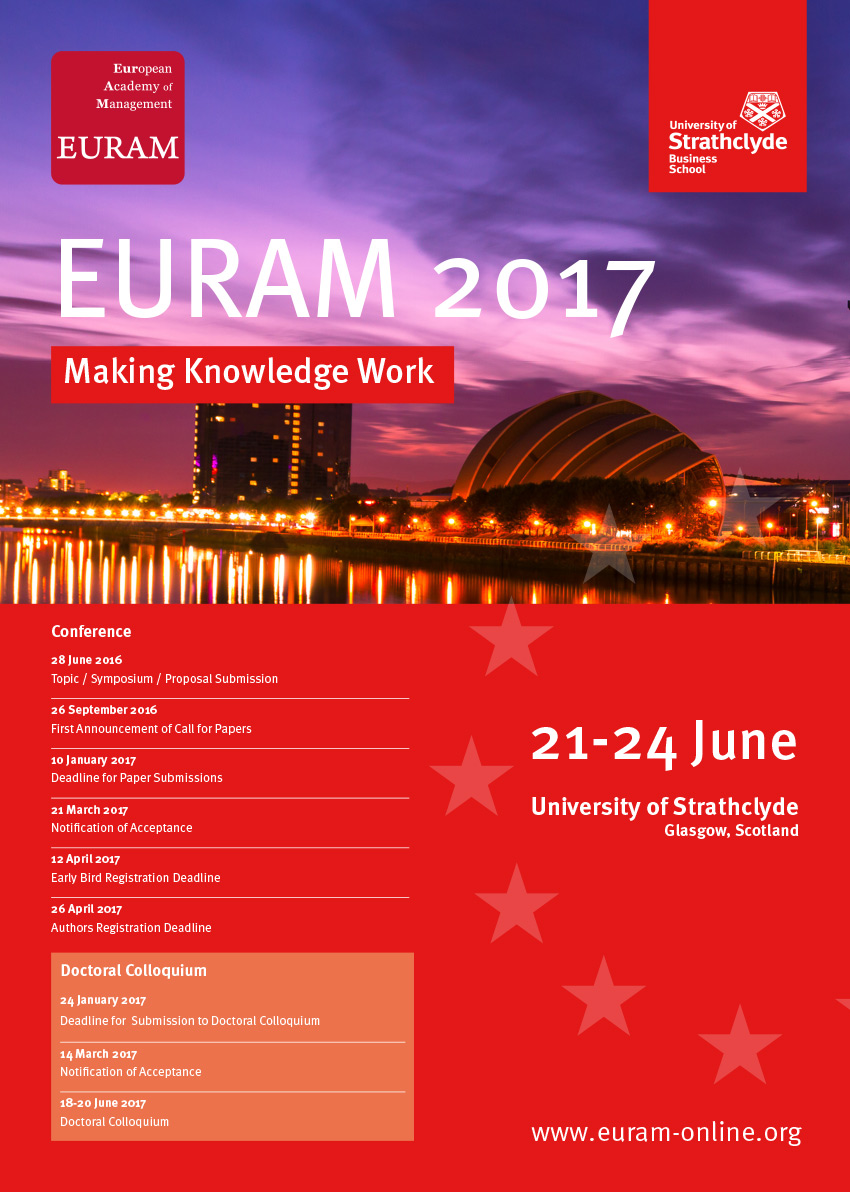The purpose of the OB SIG is to develop an ongoing and constructive dialogue among organizational behaviour scholars and practitioners to conduct research that is relevant for management theory and practice in the contemporary world. The OB SIG aims at promoting research and networking interests in individual and group behaviour in the organizational context by providing a wide-ranging, engaged and internationally-focused forum to discuss and develop research and practice in the field. In addition to well-established topics the OB SIG is open to and wants to encourage submissions to different new streams of research in private, public and non-profit organizations.
SIG Officers:
Fabian Homberg (Bournemouth University, UK) This email address is being protected from spambots. You need JavaScript enabled to view it. SIG Chair
Zeynep Yalabik (University of Bath, UK) This email address is being protected from spambots. You need JavaScript enabled to view it. SIG Programme Chair
Ceydan Maden (Istanbul Kemerburgaz University, Turkey) This email address is being protected from spambots. You need JavaScript enabled to view it. Communications Officer
GT 09_00 Organisational Behaviour - SIG General Track
The OB General Track is open to all papers that broadly fall into the domain of Organizational Behaviour but are not covered by the various other tracks of the OB SIG. The OB General Track is open to a variety of themes on both well-established topics and new streams of research in public, private and non-profit organizations. The submitted papers might be dealing with the attributes, processes, mechanism, behaviours, and outcomes within and between individual, interpersonal, group, and organizational levels of analysis.
ORGANISATIONAL BEHAVIOUR SIG STANDING TRACK
ST 09_01 Team Performance Management
In this research track of Team Performance Management, we intend to organize in a more systematic manner the increasing number of papers addressing teams and team working presented at EURAM and we invite papers that explore team performance management in a multi-dimensional and dynamic way. Therefore in terms of unit of analysis, we welcome papers that study individuals in teams (e.g., how multiple-team membership impacts on individual learning and adaptation, how individual performance is influenced by team dynamics), teams as units (dynamic views on team processes, antecedents and consequences of team performance, team emergent states, team training, empirically supported team interventions, virtual teams) as well as the inter-team dynamics in larger social systems (e.g., multi-team systems dynamics and effectiveness, teamwork implementation in organizational settings). The research topic is inclusive and we expect papers that use or combine theoretical insights from a variety of disciplines (Organizational Psychology, Sociology, Management and Organization Studies) and use various research methods and approaches (ranging from field studies to experiments and formal simulations) to understand the dynamics and effectiveness of organizational teams. We intend to publish a selection of papers presented within this track in the journal “Team Performance Management”.
ST 09_02 Human Resources Management
Several social and economic changes have affected the growth of the HRM, recognizing that human resources are crucial to organizational success in most industries. Promoting theory and research development on important substantive and methodological topics in the field of HRM is therefore of foremost importance, as confirmed by the growing number of academic journals that are addressing this topic. All articles falling within the broad domain of HRM will be considered, spanning from micro HRM to strategic HRM and international HRM subfields. Empirical studies, theoretical contributions and interdisciplinary research are welcome.T 09_03 Organisational Cognition - Theories, Applications and Advancements
This topic is designed to attract papers on different aspects of cognition research applied to and concerning organizations. Submissions are very much encouraged from diverse theoretical perspectives—e.g., computationalism and its opposite, social identity theory, mental representationalism and its critics, sensemaking—as well as from different disciplinary traditions even if outside organizational behavior—e.g., cognitive psychology, social cognition, cognitive science, artificial intelligence. We do not want to be constrained by methodological grounds either: the topic is open to qualitative, quantitative, and computational and mathematical simulation studies. We are open to any method but are especially hoping to attract studies that experiment with multi-methods, mixing qualitative and/or quantitative with simulation.
ORGANISATIONAL BEHAVIOUR SIG 2017 TRACKS
T 09_05 Leadership
Leadership is "a process whereby intentional influence is exerted over other people to guide, structure, and facilitate activities and relationships in a group or organization" (Yukl, 2001, p. 21). Leadership is a popular topic and a core construct of interest within the field of organizational behaviour, as it is a crucial factor influencing a range of organizational outcomes as well as employee well-being and health (among others). In light of its relevance and prevalence, we have created a specific track within EURAM to collect and curate related leadership research. We welcome theoretical and empirical papers that apply quantitative and/or rigorous qualitative methods relevant to leadership. This leadership topic proposal is purposefully broad under the general theme of leadership to appeal to multiple paradigms and approaches spanning numerous EURAM SIGs including (but not limited to) Human Resources, Gender, Race, and Diversity in Organisations, Social Issues, Business & Society, and Research Methods. However, given our primary affiliation with the Organisational Behaviour SIG, we especially encourage micro- and multi-level empirical work.
T 09_06 Demographic challenges for management
We invite articles that focus on any of the following or other demographic challenges:
- Extension of working lives and careers
- Heightened education level attainment
- Cohabitation of multiple generations in the workplace (Baby Boomers, Generation X, Millenials) and entrance of the youngest cohorts (Millenials and Generation Z)
- Geographical mobility of workforce (refugee and immigrant streams) and address any of the following aspects of employment:
- Employee staffing and retention
- Employee Rewards and motivation
- Employee training & development
- Strategic Planning
- Job Design
- Organizational and societal culture
- Leadership Development
- Inclusion
- Teams and networks
- Communication and collaboration; conflict
T 09_09 Knowledge sharing and organisational culture
More people than ever are working anywhere, anytime. This is achieved with sophisticated communications and knowledge management. A central part of knowledge management initiatives centres upon building a knowledge sharing culture. We are requiring employees to see the world in a different way. In this context, we no longer want knowledge to mean power but rather that sharing knowledge is power. None of this can be achieved without first knowing the perceptions of employees, their values and behaviours, informal and formal hierarchies. This track addresses this issue as a means of tackling the need for people to work anywhere, anytime through a multidisciplinary perspective deriving from knowledge management, cultural management, change management, diversity management and intercultural communication.









